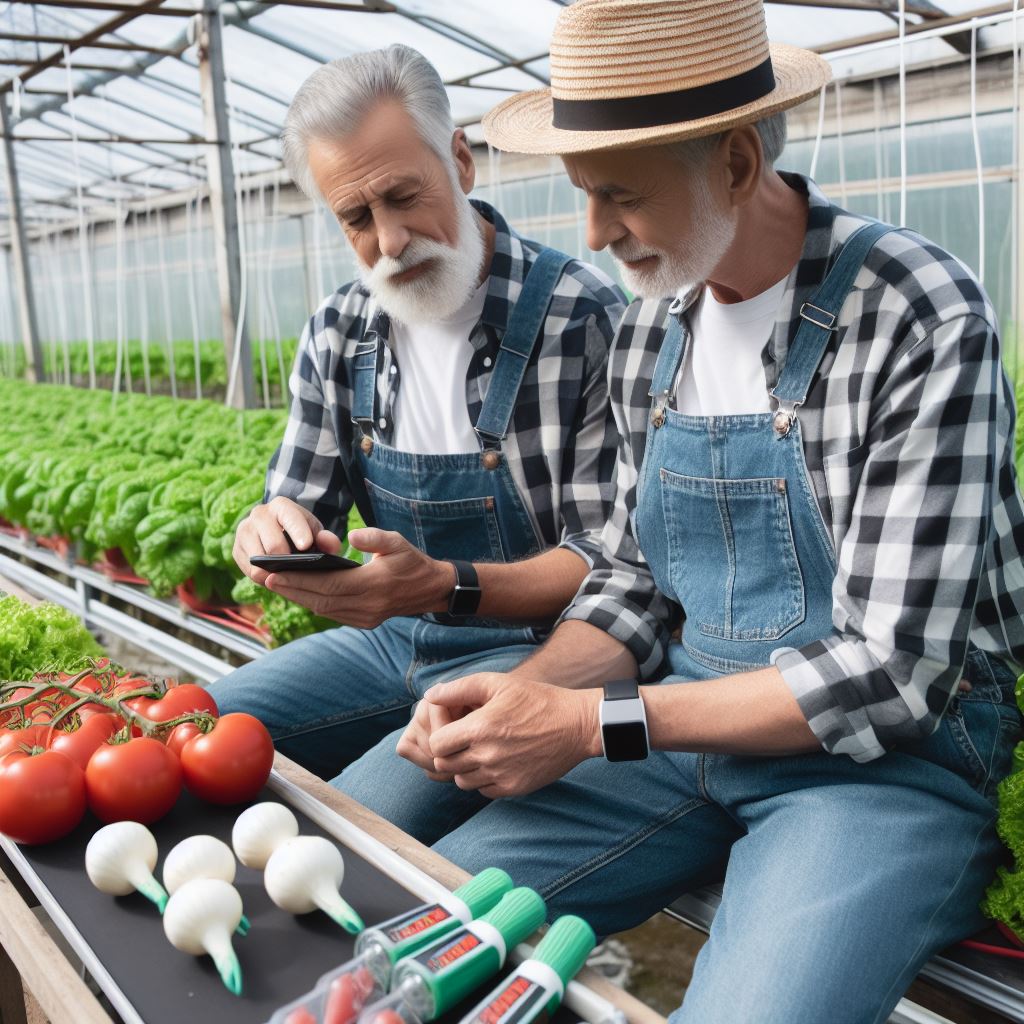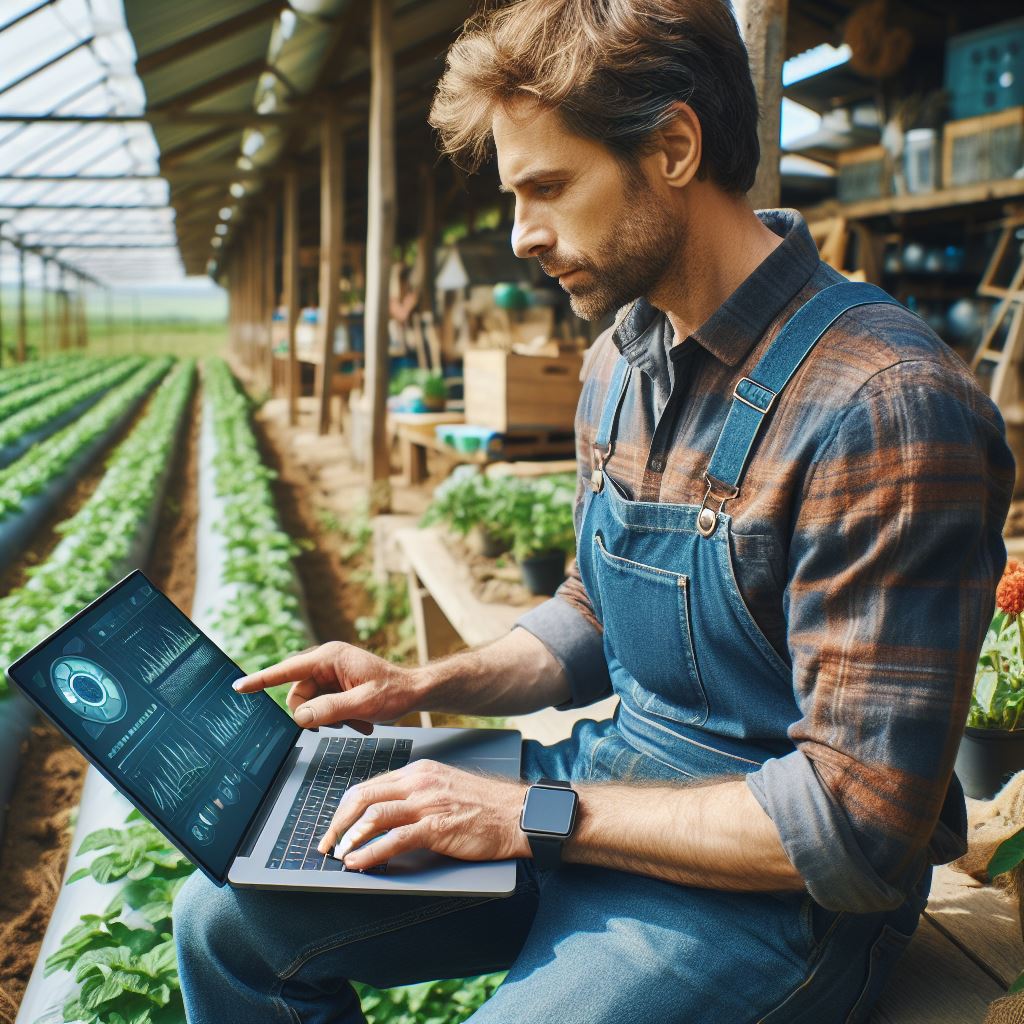Introduction
Importance of sustainable livestock farming
Livestock farming plays a crucial role in meeting the world’s growing demand for food.
However, traditional farming practices have significant environmental and social impacts.
To address these challenges, sustainable livestock farming practices are gaining momentum.
Overview of sustainable livestock farming technologies
Sustainable livestock farming technologies aim to minimize the negative impacts of traditional farming practices on the environment, animal welfare, and human health.
These technologies utilize innovative approaches to promote sustainability throughout the entire livestock production cycle.
One such technology is precision livestock farming, which utilizes sensors and data analysis to optimize animal health and welfare.
This allows farmers to make informed decisions on animal nutrition, housing conditions, and disease prevention.
Another innovative technology is vertical farming, which involves the production of livestock feed in controlled environments, such as vertical towers.
This method reduces land usage and water consumption, while also minimizing the need for chemical inputs.
Additionally, genetic technologies, such as selective breeding and genetic engineering, enable farmers to develop livestock breeds that are more efficient in terms of resource utilization and disease resistance.
Furthermore, manure management technologies, such as anaerobic digesters and composting systems, help minimize the release of greenhouse gases and pollutants from livestock waste.
Basically, sustainable livestock farming technologies are essential for addressing the environmental and social challenges associated with traditional farming practices.
These technologies promote resource efficiency, animal welfare, and environmental stewardship, ensuring a sustainable future for the livestock farming industry.
Benefits of Sustainable Livestock Farming Technologies
Sustainable livestock farming technologies offer a wide range of benefits, encompassing environmental, economic, and social aspects.
Environmental benefits
- Livestock farming is a significant contributor to greenhouse gas emissions, particularly methane and nitrous oxide. Sustainable farming technologies employ methods to reduce these emissions, leading to a greener and more sustainable environment.
- Water is a scarce resource, and livestock production requires vast amounts of it. Sustainable farming technologies facilitate water conservation through efficient irrigation systems and water recycling techniques, minimizing the strain on water resources.
- Biodiversity preservation is crucial for maintaining a healthy ecosystem. Sustainable livestock farming technologies promote biodiversity by implementing practices that protect habitats, prevent soil erosion, and maintain balanced ecosystems.
Economic benefits
- Adopting sustainable farming technologies enhances productivity and profitability for farmers. These technologies optimize livestock management, leading to increased yields, improved quality, and reduced losses.
- Feed and waste management are significant expenses in livestock farming. Sustainable technologies, such as precision feeding and bioenergy production from waste, help reduce costs associated with feeding and waste disposal, contributing to overall economic benefits.
- Sustainable livestock farming technologies enable farmers to access new markets and meet consumer preferences. As sustainability and ethical practices become increasingly important to consumers, farmers who adopt these technologies gain a competitive edge and can tap into niche and premium markets.
Social benefits
- Improved animal welfare is a profound social benefit of sustainable livestock farming technologies. These technologies offer better living conditions, reduced stress, and enhanced health monitoring for animals, ensuring their well-being.
- Sustainable farming technologies contribute to enhanced rural livelihoods and socio-economic development. By improving productivity and profitability, these technologies provide income opportunities and create jobs within local communities, fostering economic growth and stability.
- Promotion of sustainable food production and security is a vital social benefit. By adopting sustainable farming technologies, farmers contribute to the availability of safe and nutritious food for present and future generations, ensuring food security and addressing global hunger challenges.
Generally, sustainable livestock farming technologies bring about numerous benefits across environmental, economic, and social dimensions.
Transform Your Agribusiness
Unlock your farm's potential with expert advice tailored to your needs. Get actionable steps that drive real results.
Get StartedBy mitigating greenhouse gas emissions, conserving water resources, preserving biodiversity, and promoting productivity, profitability, and access to new markets, these technologies drive positive changes in farming practices.
Moreover, they improve animal welfare, enhance rural livelihoods, and contribute to sustainable food production and security, making them indispensable in creating a more sustainable and resilient future.
Read: Breeding Tech: New Trends in Livestock Genetics
Examples of Sustainable Livestock Farming Technologies
Sustainable livestock farming technologies play a crucial role in ensuring the long-term viability and environmental sustainability of the livestock industry.
These technologies focus on minimizing resource use, reducing pollution, and improving animal welfare and performance.
In this section, we will explore some examples of sustainable livestock farming technologies.
Precision Livestock Farming
Precision livestock farming involves the use of sensors and IoT devices for monitoring and managing livestock.
These technologies allow farmers to gather real-time data on various aspects of animal health, behavior, and performance.
By analyzing this data, farmers can make informed decisions to optimize animal well-being and productivity.
For example, sensors can detect changes in temperature or activity levels, indicating potential health issues in animals.
By addressing these problems early, farmers can prevent diseases and ensure the overall health of their livestock.
Furthermore, precision livestock farming provides numerous benefits in terms of animal health, well-being, and performance.
By closely monitoring individual animals, farmers can tailor their care, nutrition, and medication to meet their specific needs.
This personalized approach leads to improved animal welfare, reduced disease incidence, and enhanced production efficiency.
Additionally, precision farming techniques help minimize the use of antibiotics, as farmers can detect and treat diseases promptly, reducing the need for preventive medication.
Integrated Farming Systems
Integrated farming systems involve the combination of livestock, crops, and renewable energy production on a single farm.
This approach promotes synergy between different components, resulting in a more sustainable and efficient farming system.
Livestock waste, such as manure, can be used as fertilizer for crop production, reducing the need for synthetic fertilizers and minimizing nutrient runoff into water bodies.
Simultaneously, crop residues and by-products can be used as feed sources for the livestock, reducing the reliance on traditional feed crops.
Moreover, integrated farming systems also incorporate renewable energy production, such as solar or biogas generation.
By utilizing renewable energy sources, farmers can reduce their reliance on fossil fuels and decrease greenhouse gas emissions.
The symbiotic relationship between livestock farming, crop production, and renewable energy generation results in a more closed-loop and sustainable farming system.
Alternative Feed Sources
To reduce the environmental impact of livestock farming, alternative feed sources are being explored. Insects, algae, and by-products from various industries can be utilized as nutritious feed options for livestock.
For example, black soldier fly larvae are rich in protein and can be grown on organic waste.
Showcase Your Farming Business
Publish your professional farming services profile on our blog for a one-time fee of $200 and reach a dedicated audience of farmers and agribusiness owners.
Publish Your ProfileSimilarly, algae cultivation can yield protein-rich supplements for livestock.
By incorporating these alternative feed sources, farmers can reduce the pressure on traditional feed crops, such as soy and corn, which require large amounts of land, water, and fertilizers for production.
Furthermore, alternative feed sources have the potential to improve the nutritional profile of animal products.
For instance, insects and algae-based feeds can enhance the omega-3 fatty acid content of meat and eggs.
This leads to healthier and more sustainable food options for consumers, while also reducing the environmental footprint of livestock farming.
Waste Management Innovations
Effective waste management is crucial for reducing pollution and maximizing resource utilization in livestock farming.
Innovations such as anaerobic digestion systems are being implemented to convert livestock waste into biogas.
Anaerobic digestion not only produces renewable energy but also reduces the release of methane, a potent greenhouse gas, into the atmosphere.
The generated biogas can be used for on-farm energy needs or even sold back to the grid.
In addition to biogas production, waste management innovations focus on nutrient recovery and utilization.
Livestock waste contains valuable nutrients, such as nitrogen and phosphorus, which can be recycled as fertilizers.
By capturing and properly managing these nutrients, farmers can reduce their reliance on synthetic fertilizers and minimize nutrient runoff, which contributes to water pollution.
Essentially, sustainable livestock farming technologies offer promising solutions for achieving environmental sustainability and enhancing animal welfare within the livestock industry.
Precision livestock farming, integrated farming systems, alternative feed sources, and waste management innovations all contribute to a more sustainable and efficient farming system.
By implementing these technologies, farmers can optimize resource utilization, reduce pollution, and ensure the long-term viability of the livestock industry.
Read: Biosecurity in Livestock Farms: Key Practices
Challenges and Limitations
Adoption barriers for small-scale farmers
- Lack of awareness and knowledge about sustainable livestock farming technologies in small-scale farming communities.
- Limited access to training and resources needed to implement and maintain sustainable farming practices.
- Resistance to change traditional farming methods due to cultural and generational influences.
- Financial constraints and inability to afford the initial investment required to adopt advanced technologies.
Costs and investment requirements for advanced technologies
- High upfront costs associated with purchasing and installing advanced technologies such as automated feeding systems or anaerobic digesters.
- Ongoing maintenance and operational costs can be burdensome for small-scale farmers with limited financial resources.
- Lack of financing options and difficulty in accessing loans or grants to fund the adoption of sustainable livestock farming technologies.
- Uncertainty about the return on investment and profitability of implementing advanced technologies.
Potential unintended consequences and risks
- Increased dependency on technology and the risk of system failures or malfunctions leading to disruptions in livestock production.
- Adverse environmental impacts associated with certain technologies, such as increased energy consumption or waste management challenges.
- Potential health risks for both animals and humans due to the use of certain technologies or the mishandling of waste products.
- The need for careful monitoring and management to prevent unintended negative consequences on biodiversity and ecosystem health.
Need for supportive policies and regulations
- Lack of clear and favorable policy frameworks that encourage and incentivize the adoption of sustainable livestock farming technologies.
- Inconsistent or conflicting regulations at various levels of government that create barriers or confusion for farmers.
- The need for financial incentives, grants, or tax breaks to offset the costs of implementing sustainable livestock farming technologies.
- Collaboration between policymakers, researchers, and farmers to develop and implement effective regulations and standards.
In general, the adoption of sustainable livestock farming technologies faces several challenges and limitations.
Small-scale farmers encounter adoption barriers due to lack of awareness, limited access to resources, and resistance to change.
The high costs and investment requirements associated with advanced technologies pose financial challenges for farmers.
Additionally, potential unintended consequences and risks, such as environmental impacts and health risks, must be carefully considered.
Supportive policies and regulations are necessary to address these challenges, including clear policy frameworks, financial incentives, and collaboration among stakeholders.
Read: Top 2024 Livestock Health Monitoring Gadgets

Success Stories and Case Studies
Implementation of sustainable livestock farming technologies in developed countries
- In countries like the United States and Germany, sustainable livestock farming technologies have gained significant traction.
- Efficient manure management systems have been implemented to reduce environmental pollution and produce valuable biogas.
- Farmers have adopted precision agriculture techniques, utilizing smart sensors and drones for optimized feeding and monitoring.
- Innovative practices like rotational grazing and silvopasture have been employed to improve soil health and maintain biodiversity.
- Investment in advanced genetics and breeding methods has led to healthier and more productive livestock.
- Collaborative efforts between governments, research institutions, and farmers have facilitated the successful implementation of these technologies.
- These practices have not only improved the sustainability of livestock farming but also increased profitability for farmers.
- Sustainable livestock farming technologies in developed countries serve as inspiring examples for others worldwide.
- Knowledge sharing platforms and networks have been established to promote the adoption of these technologies on a global scale.
Promising initiatives in developing nations
- Developing nations are also making strides in the adoption of sustainable livestock farming technologies.
- In countries like Kenya and Brazil, small-scale farmers have embraced innovative solutions to overcome resource limitations.
- Mobile technology has played a crucial role in providing farmers with access to information, market prices, and veterinary services.
- Agroecology practices, such as organic farming and integrated crop-livestock systems, have been implemented to increase productivity and reduce environmental impact.
- Community-based initiatives have empowered farmers to collectively manage natural resources and establish sustainable farming models.
- Innovative financing models, including microcredit schemes, have enabled small-scale farmers to invest in modern livestock technologies.
- Capacity building programs and training initiatives have been instrumental in equipping farmers with the knowledge and skills required for successful implementation.
- These initiatives have not only improved livelihoods but also contributed to food security and poverty alleviation in rural areas.
- International organizations and NGOs are actively supporting these initiatives through funding, knowledge transfer, and technical assistance.
In essence, the implementation of sustainable livestock farming technologies has demonstrated success stories in developed countries and promising initiatives in developing nations.
The adoption of these practices has led to enhanced environmental sustainability, increased profitability, and improved livelihoods for farmers.
Collaborative efforts and knowledge sharing have been crucial in driving the widespread acceptance of these technologies.
As we continue to address the challenges of feeding a growing global population, sustainable livestock farming technologies offer practical solutions that can be tailored to different contexts and contribute to a more sustainable future.
Read: Eco-Friendly Livestock Equipment: What’s New?
You Might Also Like: Future Crops: Biotech for Better Yield
Conclusion
Recap of the importance of sustainable livestock farming technologies
Sustainable livestock farming technologies are crucial for ensuring the long-term viability of the industry.
They help address environmental concerns, improve animal welfare, and enhance productivity.
Potential for future advancements and market opportunities
The development and adoption of innovative technologies in livestock farming present exciting possibilities for the future.
These advancements can lead to increased efficiency, profitability, and competitiveness in the market.
Call to action for stakeholders to promote sustainable practices in livestock farming
It is essential for all stakeholders in the livestock farming sector, including farmers, policymakers, and consumers, to actively promote and support sustainable practices.
By investing in and adopting sustainable technologies, we can protect the environment, ensure animal welfare, and meet the growing demand for responsibly-produced food.
In a nutshell, sustainable livestock farming technologies are not just an option but a necessity.
They offer numerous benefits and opportunities for the industry.
It is up to all of us to take action and contribute to a more sustainable and resilient future for livestock farming.




